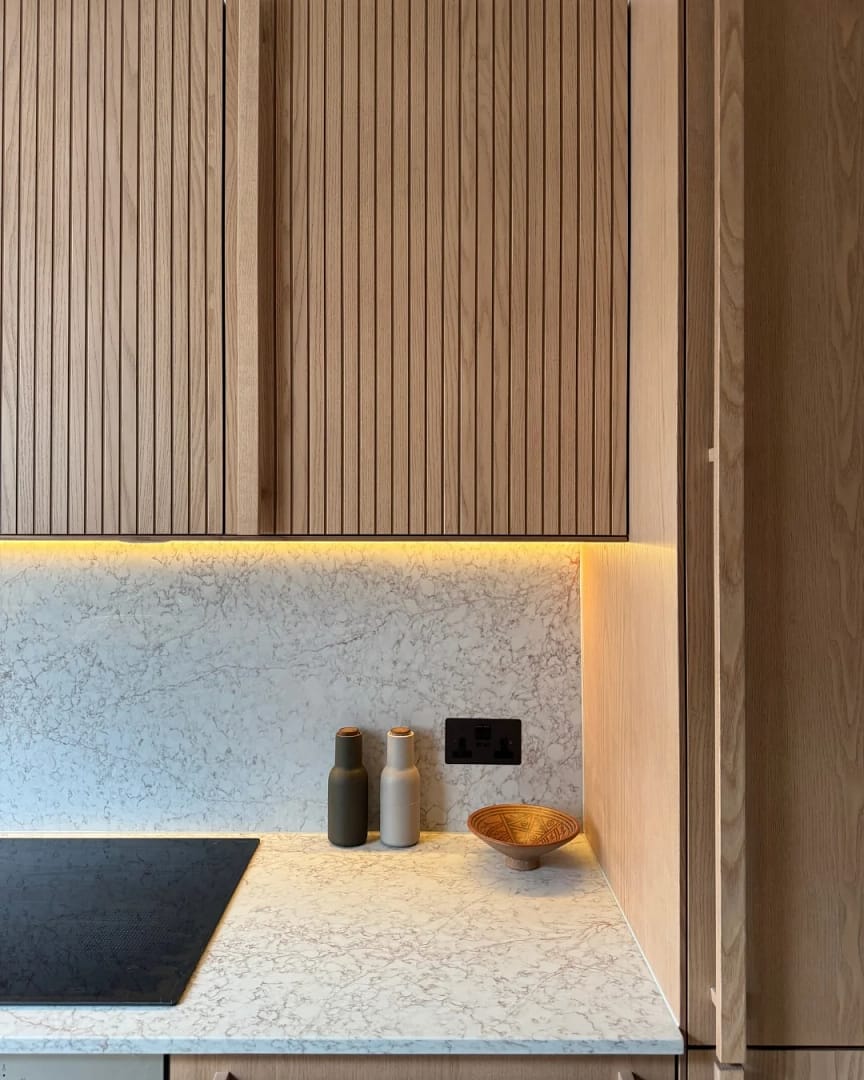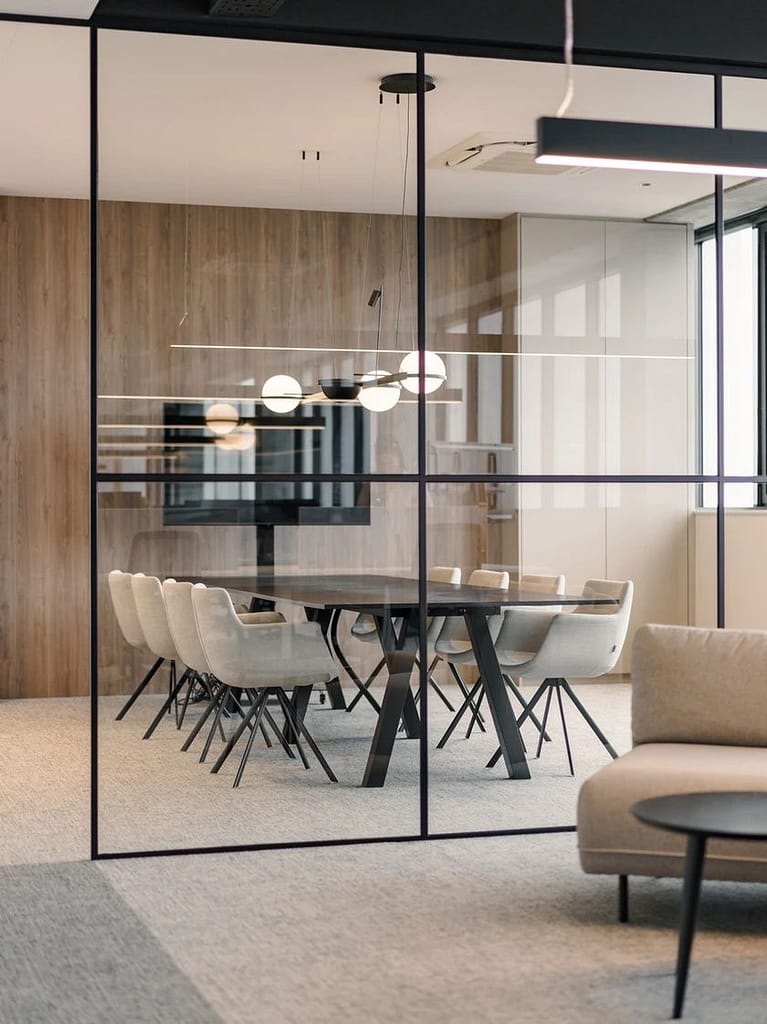
- Commercial
Office Renovation Vancouver: Open Concept vs Private Office Productivity Study (2025 Shocking Results)
- By matin@quayconstruction.ca
Table of Contents
WARNING: Your office layout might be silently destroying your team’s productivity.
Workers in open offices took 62% more sick days than those in private offices, according to recent research from the Scandinavian Journal of Work, Environment & Health. Yet 71.4% of employees in open plan offices say the design has improved their productivity. This contradiction reveals a dangerous disconnect between perception and reality that’s costing Vancouver businesses millions in lost productivity.
With downtown Vancouver’s office vacancy rate seeing a notable increase and companies desperately fighting for top talent, the stakes have never been higher. At QUAY, we’ve completed many office renovations in Vancouver and discovered the hidden factors that determine whether your office layout drives success or sabotages your team’s performance.
The Vancouver Office Crisis: Why 90% of Companies Are Getting It Wrong
Metro Vancouver as a whole saw an uptick in its leased office vacancy rate, and its major submarket of downtown Vancouver was no exception. This isn’t just a real estate problem—it’s a productivity crisis masked as a design debate.
The Alarming Statistics:
- Open office workers took 62% more days off compared to private offices
- Those in assigned-seat open offices reported the worst health and job satisfaction, whereas those in private offices reported the highest
Yet companies continue investing in office layouts that actively harm their workforce. The solution isn’t choosing sides—it’s understanding the science behind what actually works.
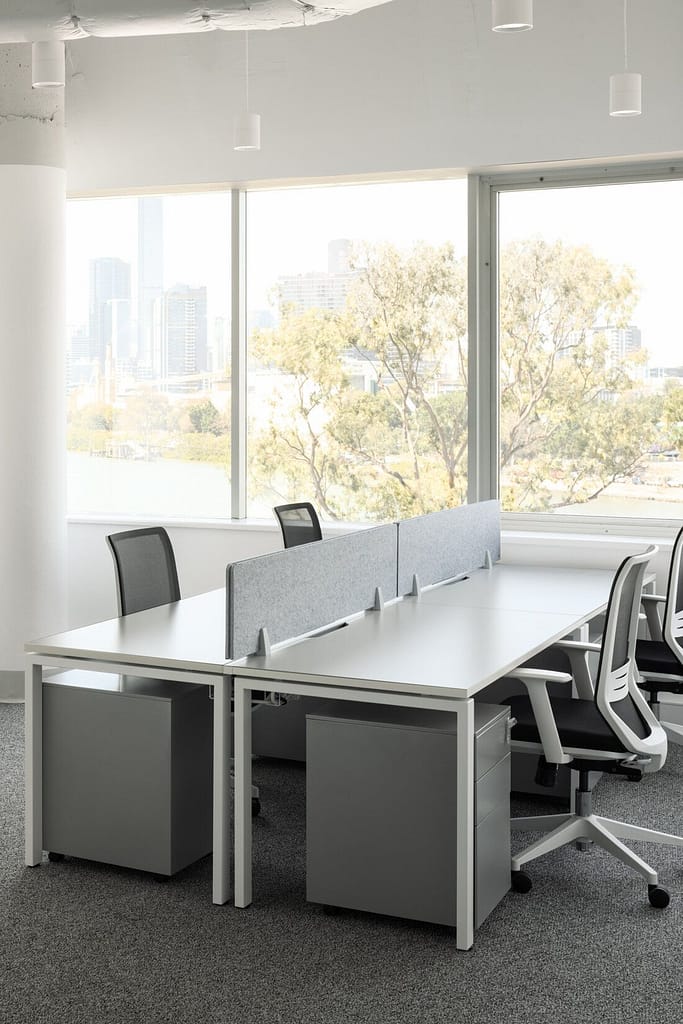
The Hidden Dangers of Open-Concept Offices (That Nobody Talks About)
The Productivity Paradox
Open-plan offices can reduce real-estate costs but lead to lower performance levels, thereby imposing a tax on productivity which outweighs the initial cost savings. Here’s what the research reveals:
The Shocking Health Impact:
- Viruses spread quickly in open environments, increasing workplace absenteeism
- Workers’ immune systems suffer when stress levels are already high
- Open office workers experience dramatically higher noise levels and reduced sound privacy
The Collaboration Myth: Harvard Business Review found that open offices produce less meaningful interaction—not more. This happens because individuals become adept at shutting people out and reading signs that their coworkers wish to be left alone.
When Open Offices Actually Work (The 3 Critical Conditions)
Despite the research warnings, open offices aren’t universally bad. The general principle: In jobs requiring high levels of short, informal and immediate interactions between people, open plan offices can be more productive. However, three critical conditions must be met:
1. Industry-Specific Requirements Creative teams, marketing departments, and customer service roles benefit from immediate collaboration and energy flow that open designs provide.
2. Proper Acoustic Design Modern open offices require sophisticated sound management systems, not just removed walls. Without proper acoustic planning, productivity plummets.
3. Activity-Based Zones Successful open offices provide different spaces for different tasks—not just one large room where everyone struggles to focus.
Common Open-Concept Challenges
Noise and Distractions Traditional open offices can create productivity-killing noise levels. However, modern design solutions including acoustic panels, sound-masking systems, and strategic layout planning can mitigate these issues.
Lack of Privacy Without proper planning, open offices can leave employees feeling exposed and unable to focus on complex tasks or have confidential conversations.
Health and Wellness Concerns Research shows that open office plans can decrease productivity and employee well being while increasing sick days.
Why Private Offices Are Making a Comeback (And Why It Matters for Your Bottom Line)
The Science Behind Private Office Productivity
In jobs or industries where high levels of focus and concentration are required, private offices work best. The evidence is overwhelming:
Peak Performance Metrics:
- Private office workers reported the highest health and job satisfaction compared to open office workers
- Knowledge workers in private offices demonstrate significantly higher concentration levels
- Companies with private offices report better employee retention rates
The Executive Advantage: Our experience with downtown Vancouver office renovations shows that private offices aren’t just status symbols—they’re productivity tools that provide measurable ROI through:
- Enhanced decision-making capabilities
- Reduced cognitive load from distractions
- Improved confidential communication
- Higher quality strategic planning sessions
Private Office Advantages
Maximized Focus and Productivity Private offices eliminate most external distractions, allowing employees to engage in deep work and complex problem-solving without interruption.
Enhanced Privacy and Security Sensitive conversations, confidential documents, and strategic planning can occur without concern for eavesdropping or visual intrusion.
Personalization and Ownership Private offices allow employees to customize their environment, leading to increased job satisfaction and sense of ownership.
Status and Retention Benefits Private offices can serve as important retention tools and career advancement rewards, particularly for senior-level positions.
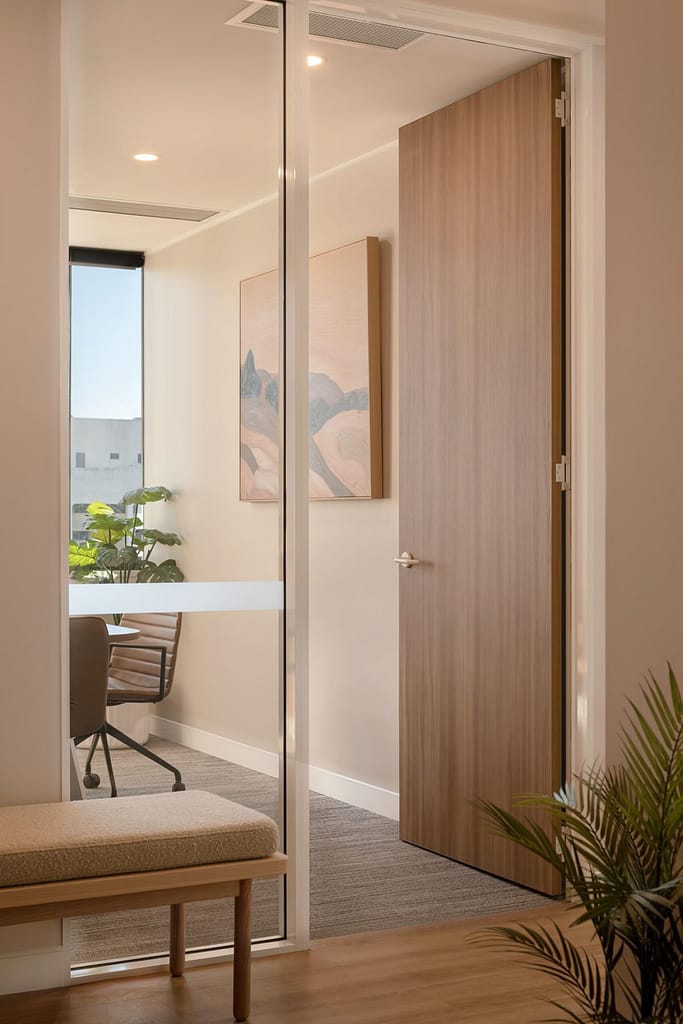
The Game-Changing Solution: Why Flex Offices Are Dominating Vancouver’s Most Successful Companies
The 2025 Breakthrough: Activity-Based Working
The flex office appears to be preferred over traditional open offices, and in some cases, it seems to even outperform private offices. This breakthrough approach combines the best of both worlds while eliminating the weaknesses that plague traditional layouts.
The Vancouver Success Formula: Companies are implementing activity-based working environments that provide different spaces for different tasks. This isn’t just trendy—it’s scientifically proven to boost productivity while reducing costs.
The Four Essential Zones That Actually Work:
1. Deep Focus Zones (Private Office Alternative) These spaces eliminate the increase in sick days associated with open offices while providing the concentration benefits of private offices without the high construction costs.
2. Active Collaboration Spaces Unlike traditional open offices that create meaningless interaction, these spaces are specifically designed for productive teamwork with proper acoustic separation.
3. Flexible Meeting Environments Multiple room sizes and configurations that adapt to different team dynamics, from confidential one-on-ones to large group sessions.
4. Restoration and Social Areas Mental health-focused spaces that provide necessary breaks from focused work, reducing stress and improving overall wellbeing.
Implementing Activity-Based Design
Our office renovation experience shows that successful activity-based offices require careful planning of traffic flow, sight lines, and acoustic separation between different zones.
Vancouver-Specific Considerations
Local Market Factors
High Real Estate Costs Vancouver’s expensive commercial real estate market makes space efficiency crucial. Hybrid designs that can accommodate fluctuating occupancy levels provide better ROI than fixed private offices.
Sustainability Requirements Vancouver’s commitment to environmental sustainability means office designs must incorporate energy-efficient systems and sustainable materials. Open-concept designs often provide better airflow and natural light utilization.
Seismic Considerations All Vancouver office renovations must comply with seismic safety requirements, which can affect the structural possibilities for private office construction.
Regulatory Compliance
Understanding Vancouver’s office renovation permit requirements is crucial for both open-concept and private office designs. Different layouts may have varying requirements for:
- Fire safety and egress planning
- Accessibility compliance
- Electrical and HVAC modifications
- Structural changes
Making the Right Choice for Your Team
Assessment Framework
Evaluate Your Work Style Consider your team’s primary activities. Knowledge workers requiring deep concentration may benefit from private offices, while creative teams might thrive in open environments.
Consider Your Industry Legal, financial, and healthcare firms often require private offices for confidentiality, while tech companies and creative agencies may prefer open-concept designs.
Analyze Your Budget Office renovation costs in Vancouver vary significantly based on layout complexity. Open-concept designs typically cost less per square foot than private office construction.
Plan for Growth Consider how your team might expand or contract over the next 5-10 years. Flexible designs accommodate change better than fixed private offices.
Implementation Strategy
Phase 1: Assessment and Planning Begin with a thorough analysis of your current workflow, team dynamics, and space utilization patterns. This assessment should inform your design decisions.
Phase 2: Design Development Work with experienced renovation professionals to create detailed plans that balance your aesthetic preferences with functional requirements.
Phase 3: Permit and Approval Process Navigate Vancouver’s regulatory requirements with proper permit applications and approvals before construction begins.
Phase 4: Construction and Implementation Execute your renovation with minimal disruption to business operations through careful project management and phased implementation.
Avoiding Common Office Layout Mistakes
Based on our experience with common office renovation mistakes, here are critical pitfalls to avoid:
Ignoring Acoustic Design Both open and private offices require careful acoustic planning. Poor sound management can destroy productivity regardless of layout choice.
Overlooking Technology Integration Modern offices require robust technology infrastructure. Plan for adequate power, data connectivity, and presentation capabilities in all spaces.
Neglecting Change Management Layout changes significantly impact employee workflow and comfort. Involve your team in the planning process and provide adequate transition support.
Underestimating Timeline Requirements Office renovation timelines in Vancouver can be affected by permit approvals, material availability, and construction complexity. Plan accordingly.
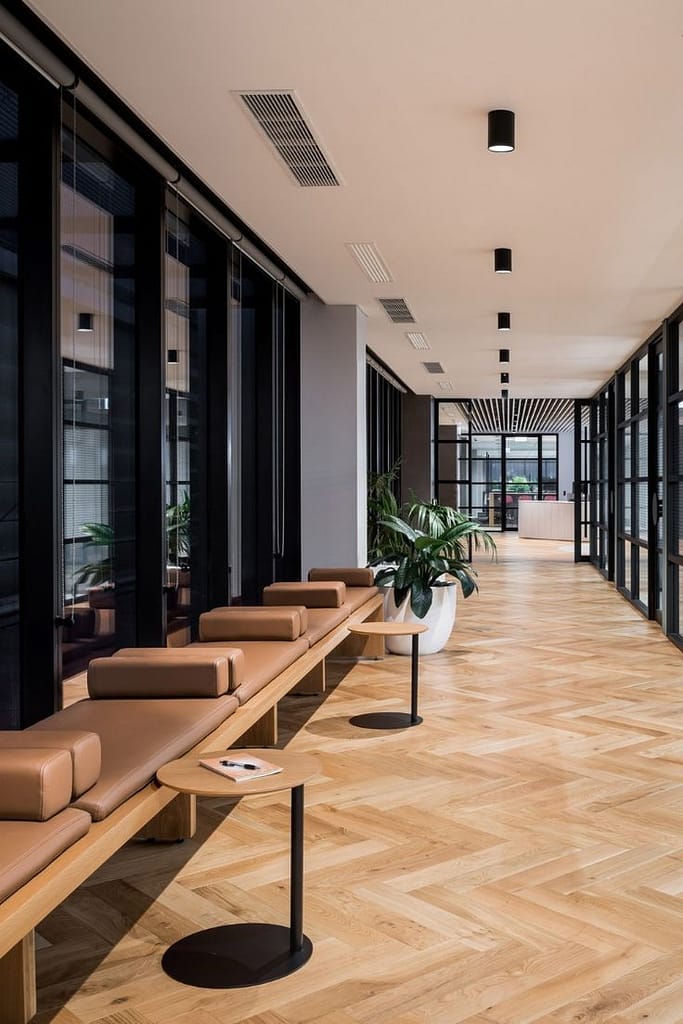
Future-Proofing Your Office Design
2025 Trends to Consider
Biophilic Design Elements Research shows biophilic design boosts productivity, creativity, wellbeing, and employee satisfaction. Both open and private offices can incorporate natural elements, living walls, and organic materials.
Smart Technology Integration Modern offices require adaptive lighting, climate control, and booking systems that can optimize space usage regardless of layout choice.
Wellness-Focused Design Post-pandemic awareness has elevated the importance of air quality, natural light, and mental health considerations in office design.
Modular and Flexible Systems Free desking, task-based zones and modular furniture allow offices to adapt quickly to changing needs.
Long-Term Considerations
Lease Flexibility Design choices should align with your lease terms and renewal options. Extensive private office construction may not be worthwhile for short-term leases.
Resale Value Consider how your office design choices might affect future marketability if you need to sublease or sell your space.
Scalability Plan for potential team growth or reduction by incorporating flexible elements that can be reconfigured without major renovation.
Maximizing Your Investment
Working with Renovation Professionals
Successful office layout decisions require expertise in multiple areas including design, construction, project management, and regulatory compliance. Working with experienced Vancouver office renovation specialists ensures your project achieves its productivity and aesthetic goals while staying within budget and timeline constraints.
Understanding Total Cost of Ownership
Consider not just initial construction costs but also:
- Ongoing maintenance requirements
- Energy efficiency impacts
- Employee satisfaction and retention effects
- Flexibility for future changes
Conclusion
The choice between open-concept and private offices isn’t binary in 2025. Vancouver’s most successful companies are creating hybrid environments that provide the right space for the right activity. Whether you choose an open-concept design for its collaborative benefits, private offices for focused work, or a hybrid approach that combines both, the key is understanding your team’s specific needs and implementing a solution that supports their productivity and wellbeing.
At QUAY, we’ve helped dozens of Vancouver businesses navigate these complex decisions and create office environments that truly support their teams’ success. Ready to transform your workspace? Contact us today to discuss how the right office layout can revolutionize your team’s productivity and satisfaction.
QUAY specializes in commercial office renovations throughout Vancouver. From initial design consultation to final construction, we handle every aspect of your office transformation. Contact us for a free consultation and discover how we can help create the perfect workspace for your team.
Related Posts
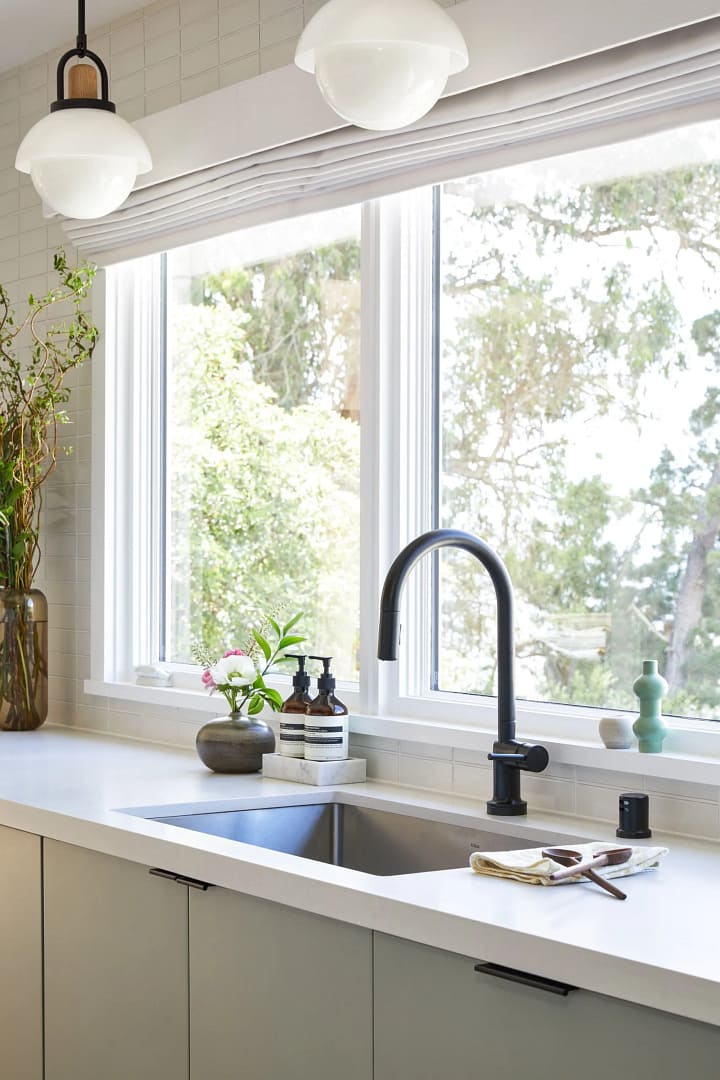
How Long Does a Kitchen Renovation Take in Vancouver? Timeline by Scope
